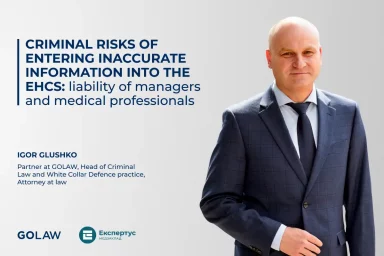The Buzz in Ukraine: Interview with Valentyn Gvozdiy of GOLAW
Ukraine is gradually returning to normal operations says Valentyn Gvozdiy, Managing Partner at Golaw in Kyiv, but he admits the preceding period has been difficult.
Most companies had to face many challenges of finding new ways to work in a short time span. Closing of industries and venues, self-isolations and lockdowns, strict bans on business activities, and public events were important measures needed to prevent and fight this virus. However, experienced managers understand the situation and fortunately knew how to cope with the issues that arose with the COVID-19 outbreak
Valentyn Gvozdiy
Gvozdiy reports that, even though there were many challenges to face and little time to organize, successful solutions were found to help conditions return to normal as fast as possible. The Ukrainian Parliament approved anti-crisis measures in light of the COVID-19 outbreak to stabilize the economy. During the last few months, Ukrainian state authorities adopted and implemented specific laws and decrees aiming to prove benefits both for businesses and individuals, involving such areas as taxes and fees, tax audits, сorporate management, court proceedings, and leases.
The current high-priority goal for the Government is to enforce a regulatory framework that provides meaningful social and economic support to people and businesses to recover from the crisis
Valentyn Gvozdiy
“The measures already taken by the Government include an increase of income limits for single taxpayers, VAT exemption from the importation into and supply within Ukraine of medicines, medical devices, and equipment necessary to fight COVID-19. The list of tax audits, which may be carried out during quarantine, was expanded regarding such activities as accounting, licensing, production, storage, transportation of fuel, etc.”
Gvozdiy is enthusiastic about some of the technological tools that have appeared during this period. “Adjustments were also made to corporate governance,” he says. “Corporate management in the future will mostly be carried out using electronic systems, which will allow companies to continue providing business as usual. The National Securities and Stock Market Commission developed and introduced a temporary procedure for convening remote general meetings of joint-stock companies and corporate investment funds. Convening and holding remote meetings is to be carried out using electronic services and the depository system based on an agreement to be concluded between the issuer and the National Depository. This technological platform ensures the appropriate level of security of information transmitted through the depository system, as well as confirmation of the credentials of the shareholders in the process of holding remote meetings with an electronic signature.”
According to Gvozdiy, “holding general meetings remotely is a right, not an obligation, of joint-stock companies and corporate investment funds. Companies may refrain from holding a general meeting during quarantine and hold it till the quarantine ends up. The platform meets international standards and a high level of team competencies, as well as creates a new service for remote voting to ensure a high level of continuous corporate governance while at the same time data protection.”
Even so, sighing, Gvozdiy says that the crisis has proved to be a tough test for local companies, which have struggled to keep up. Still, he is confident that the Government has taken swift steps to provide necessary solutions with minimal harmful effects on the Ukrainian economy. “The most important thing for the Ukrainian economy nowadays,” he says, “is to continue cooperation with the International Monetary Fund and other international partners to have an opportunity to finance the budget deficit and refinance current debt.”
“The reduction of costs is one of the ways the Government is rescuing the economy from high inflation and not to lose the investors,” he says. “I think this mechanism will eventually work. It’s always hard to find investors in such conditions, but we are happy to see that many companies from the EU – especially from Germany— are still able to work and that their managers can combat challenges successfully.
The Prime Minister of Ukraine, Denys Shmyhal, recently announced that Ukraine is on its way out of the crisis, but extending the quarantine until June 22nd, 2020. According to Gvozdiy, the way out of the quarantine has been divided into five stages. “Two of stages have already begun,” says Gvozdiy, “but the next three are not set specifically in terms of dates. Anyway, the Government has allowed shops, shopping centers, and community services to start working again.” Gvozdiy adds that “we still need to speed up the recovery process and search for new opportunities within the market. The most important thing, as always, is to continue attracting new investors, anybody who’s willing to finance Ukrainian industries.”
Gvozdiy concludes, optimistically, that “at the end of the day, the situation won’t be as catastrophic as we once thought. The strongest businesses will survive, and because the state authorities took everything into account, I think that eventually we will recover the economy in a normal way.”
The article has been published at the CEE Legal Matters website

Dr. Valentyn Gvozdiy
Managing Partner, Attorney at law, PhD
- Contacts
- 31/33 Kniaziv Ostrozkykh St, Zorianyi Business Center, Kyiv, Ukraine, 01010
- v.gvozdiy@golaw.ua
- +38 044 581 1220
- Recognitions
- Lexology Index: Corporate Tax 2025
- ITR World Tax 2025
- Lexology Index: Client Choice 2025
- The Legal 500 EMEA 2025
- 50 Leading Law Firms Ukraine 2026
Sign up to be aware
New achievements are inspired by information. GO further, don’t miss out GOLAW news and legal alerts
Our expertise
-
- Energy and Natural Resources
- Antitrust and Competition
- Banking and Finance
- Compliance, Corporate Governance and Risk Management
- Corporate and M&A
- Criminal and White Collar Defence
- Defense in Anti-corruption procedures and regulations
- Digital Economy Practice
- Labor and Employment
- Natural Resources and Environment
- Government Relations (GR)
- Insolvency and Corporate Recovery
- Intellectual property
- International trade
- Legal support of business and private Сlients in Germany
- Litigation and dispute resolution
- Private clients
- Real Estate and Construction
- Restructuring, Claims and Recoveries
- Martial Law
- Tax and Customs
-
- Agribusiness
- Aviation
- Chemical industry
- Engineering, Construction and Building Materials
- Environment and Natural Resources
- Financial institutions
- IT and AI
- Industry and manufacturing
- Healthcare industries, Life sciences and Pharmaceuticals
- Media, Entertainment, Sports and Gambling
- Retail, FMCG and E-Commerce
- Transport and Logistics
We use cookies to improve performance of our website and your user experience.
Cookies policy
Cookies settings







